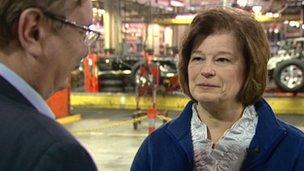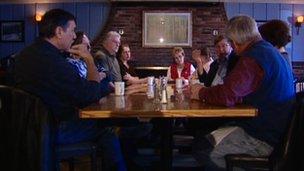Why Michigan is split on the auto bailout
- Published
- comments

"It is a very good feeling to be part of a team that is really on the upswing," Amy Farmer says
Flint, Michigan - The engine is delivered by robotic arm but it still takes two burly men to wrestle it into place in the chassis of a heavy duty pick up truck.
It is an iconic image.
The work horse of the American economy, a vehicle which is both an essential tool and the pride and joy of the blue collar workers who drive it, being put together by workers on an assembly line.
But is it a picture of Obama's success, or his failure?
'A very good feeling'
I'm inside the final assembly plant of General Motors (GM) in Flint, where after years of problems they feel they can celebrate a success story. GM as a whole has celebrated record-breaking profits of $7.6bn (£4.8bn) in 2011.
Here, they put on a third shift, meaning jobs for 800 more workers. They now make more than 700 trucks a day and sales are up.
The plant manager Amy Farmer has had to close factories in the past and she says it is a joy to work here.
"If you ever have to go through closing a facility it is devastating to the community and the families and the lives that you touch," she says. "So it is a very good feeling to be part of a team that is really on the upswing. "
She takes it as a sign the American economy is picking up.
"It bodes well for the American economy. A vehicle is a discretionary purchase. We have seen a nice growth spurt in the truck market which means things are better for construction, for building.
"That is what has allowed us to put on a third shift. When I see heavy duty trucks moving at this rate, it is a good sign for the economy."
But GM's recovery is based on its share of a massive $80bn bailout of the car industry approved by President Barack Obama.
It has become a hot issue in this primary election, and it will be even more so in the presidential election in the autumn.
All the Republican candidates opposed the bailout, although Rick Santorum has produced an advert attacking Mitt Romney for doing so, external. His argument is that Romney was inconsistent because he backed the bailout of Wall Street banks.
Assembly floor appreciation
On the assembly line they say everyone is entitled to their views, but it is clear they don't think much of the Republicans' stance.
No one I speak to has any doubt that the bailout was needed.
Lilisa Wright has worked at GM for 17 years.
"I feel better when I punch out everyday," she told me. "I feel I have a future. The bailout was very important. It was the only thing to do at that particular time.
"Without the bailout we may not have had a job. It would have been a tragedy for our country to lose General Motors."
So how does she feel when she hears candidates saying it was the wrong thing to do?
"I am not happy with that," Ms Wright says. "It doesn't show any respect for General Motors and the people who have put so much work into General Motors, and it doesn't show a commitment to our work force."
Unsurprisingly, there's no dissent from this view from the factory floor.
But the idea that Michigan is united in its support for the bailouts is simply not the case.
Pick and choose
I meet a group of Tea Party supporters near Brighton, outside of Detroit. They aren't agreed on a candidate: some are for Romney, some Santorum and some have yet to make up their mind.

Many at the Brighton tea party meeting thought bankruptcy would have made GM stronger
But they are united in telling me that the bailouts were misguided.
"I have a lot of friends from a lot of companies who didn't get bailed out," Bill Gavette says. "A lot of suppliers. The companies the auto companies owed money to, got 17 cents on the dollar and they went under, they went bankrupt.
"I have a problem with the government picking and choosing. I have a small business, a lot of us here have small businesses, if we fail we fail. The government choosing who succeeds and who fails is so against our constitution and what we were founded on."
Susan Kotrys agrees: "I owned a small business. I owned record stores in the Detroit area but they went under because the industry changed, nobody bailed me out. I didn't think of asking the government for millions. I started working and doing something else."
Their opposition is both that it is unfair some people don't get the help, but also that it stops the system from working.
Larry Recca calls bailouts "a real bad idea".
"That's not how free markets work," Mr Recca says. "If you have a lousy company they should go out of business. If they can't deal with the unions and make a profit they should go out of business."
Most of the people here see Obama and the management appeasing the unions. They think a structured bankruptcy would have let GM survive.
"My husband is in the auto industry but I thought they should go through the natural process," Deb O'Hagan says. "They may not have been called GM but they would have come out stronger."
In the primary elections, bailouts have been peripheral, because all the candidates agree that such moves were wrong.
But in November's presidential election this debate will take centre stage, hinging on whether Obama saved the American economy from a terrible state, or put it deeper into debt by defying the logic of the free market.